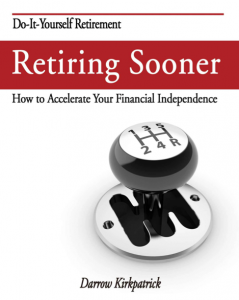Farnoosh Torabi's Blog, page 35
June 11, 2013
Secrets to the Perfect Garage Sale
Want to clear some clutter and make cold, hard cash this summer? I teamed up with Aaron LaPedis – The Garage Sale Millionaire – to learn a thing or two about throwing the perfect garage sale. Read more here.
What have been some of your best garage sale finds? Connect with me on Twitter @Farnoosh and use the hashtag #finfit.

June 10, 2013
Survey: Retirement Income Falls Short
 In almost every state, retired seniors are living off of too, too little.
In almost every state, retired seniors are living off of too, too little.
That’s according to an analysis of Census data by Interest.com, a financial information website owned by Bankrate.com. Their report shows that, more often than not, retirees aren’t living as comfortably as they should be.
While most financial experts advise living off of 70% to 80% of your pre-retirement income to keep from feeling the pinch in retirement, in 48 states, seniors have a median household income of $35,107, or 57% of the median income of younger Americans.
Also See: Top 10 States For Retirees
“People who live in a given area are competing with each other for the same goods and services, including housing, cars and groceries,” says Mike Sante, managing editor of Interest.com. “This is why we thought it would be useful to compare younger and older adults’ incomes in each state. We found that many senior citizens are significantly underfunded and risk running out of money, especially since people are living longer than they used to and may need to support a two- or three-decade retirement.”
State-By-State Ranking
Only in Hawaii and Nevada did they make at least 70% of what pre-retirement aged Americans earned. They topped the list followed by Arizona (68.1%), New Mexico (66.9%) and Florida (66.9%.) The states where seniors have it (comparatively) the worst? Massachusetts fell to the absolute bottom of the list. There, residents live on just 45% of the income of their pre-retirement counterparts. In the states that follow: North Dakota, Rhode Island, New Jersey and New Hampshire, seniors make do on nearly half of what their neighbors make in their pre-retirement years.
Start Saving Now
Along with investment, a key factor in building a comfortable nest egg is time. Start saving early to earn all the wonderful interest between now and your retirement date. Examine your options. Many Americans choose some combination of an employer-sponsored 401(k,) Roth IRA, traditional IRA, stocks and savings. What’s best for you will be determined by whether or not you can tolerate risk and how fast you want to reach your retirement goals. Finally, when we caught up with retirement guru, Darrow Kirkpatrick earlier this month, his key tips for retirement saving were pretty simple: Avoid debt while maxing out retirement contributions and limit splurges.
Photo Courtesy, 401(K) 2012.

June 7, 2013
Online Deals That Aren’t
In this week’s Savvy Spender video on Yahoo! Finance learn how to spot online scams and other “deals” that…aren’t. Read more here.
Have you come across any online deals that simply aren’t? Connect with me on Twitter @Farnooshand use the hashtag #FinFit.

Avoid These Moving Scams
 An estimated 37 million Americans change households every year, according to U.S. Census Bureau. More than half make their move during the summer months and, of all of the months to move, June is the most popular.
An estimated 37 million Americans change households every year, according to U.S. Census Bureau. More than half make their move during the summer months and, of all of the months to move, June is the most popular.
If you’ve ever had to relocate, you know that no matter the time of year, moving can be wrought with stress and very expensive. But did you know it’s also an opportunity for scammers?
Last year, the Better Business Bureau received more than 8,500 complaints against movers. Complaints were mostly for the things you’d suspect: damaged or lost items, squabbles over the rate charged. Another common complaint, however, was a type of scam – one where movers will offer a low-ball rate to lure consumers in. Everything will seem peachy as they load all your worldly possessions onto their truck but right when it’s time to unload, they hike up the price – essentially holding your household items hostage.
To help you have a fraud-free move this summer, here are a few tips for spotting and avoiding the scam.
Look For Red Flags
Nowadays, many find their moving company online. There’s no problem with that but it’s a red flag if a company insists on giving you an estimate over the phone or Internet instead of coming to your home, according to the experts at Consumer Reports. For the most accurate pricing, you want to have your boxes counted, weighed, measured. Other red flags: the company demands cash or a large deposit before the move and unmarked (or rented) moving trucks. Today, anyone with a truck, two guys and a website can have a “moving company.” That being the case, not all are properly licensed and aware of the law – much less your rights. Interstate movers are licensed by the Federal Motor Carrier Safety Administration. Screen movers using their site, ProtectYourMove.gov. There you can also find the state agency that regulates in-state moves in your homestate.
Vet Your Movers
Along with avoiding blatant scammers, Consumer Reports offers advice for researching and finding a quality mover. First, like with most services, you want to get a recommendation from those you know and trust. Then, of course, make sure the company is licensed. Before going with a mover, check resources like the BBB for complaints and search the company’s name online to find reviews. If anyone mentions scam-like activity, run! Finally, never pay cash for a move and read your contract carefully. Never sign a contract where the weight or size of your move is left blank. It’s like signing a blank check and opening yourself up to potential fraud.
Photo Courtesy, ibm4381.

June 6, 2013
Hot Celeb Vacation Spots for Less
Hollywood celebrities have it all: fame, fortune, good looks and a jet-set lifestyle. But you don’t need to be rich and famous to vacation like your favorite A-lister. Here’s how to afford five of the hottest celebrity vacation spots for less. Read more here.
What’s your absolute dream vacation? Connect with me on Twitter @Farnoosh and use the hashtag #finfit.

Budgeting 101 for Freelancers
 The skills and know-how to not only survive — but thrive — with an up-and-down, feast and famine income cycle can be challenging even for a seasoned freelancer. Those with unpredictable cash flow must arguably budget differently, or at least more carefully, to not only make end’s meet when work is scarse, but also to remain responsibly frugal when funds are flowing fast. A freelancer’s life is never dull–which is all the more reason to make sure your money situation stays remarkably reliable.
The skills and know-how to not only survive — but thrive — with an up-and-down, feast and famine income cycle can be challenging even for a seasoned freelancer. Those with unpredictable cash flow must arguably budget differently, or at least more carefully, to not only make end’s meet when work is scarse, but also to remain responsibly frugal when funds are flowing fast. A freelancer’s life is never dull–which is all the more reason to make sure your money situation stays remarkably reliable.
Track Your Spending
It’s prudent for those whose income is unstable to work “backwards”—starting with the total amount you spend first, in order to calculate how much you’ll need on an ongoing basis. Keep track of your spending for at least a few weeks or a couple months so you know what to “pay” yourself each month no matter what kind of money you’re making.
Using a 50/20/30 rule, the idea is to delegate all your money into three categories: essentials, priorities and lifestyle.
Get Bank
Get organized by setting up a few different bank accounts. As a freelancer, you might already have a business account, and all your income should be flowing into here, as this is the account you’ll write yourself a “paycheck” from. Your personal checking account is where you pay all your bills, including your priority spending.
Earmark Essentials
Roughly half your income is probably caught up in true necessities like rent or mortgage, basic utilities including internet and phone — if you work from home, this is a necessity — as well as transportation and groceries. Only include dining out if it’s essential to your job such as for business meetings, etc.
Prioritize Saving
Anything you make above this line goes to your priorities that help ensure a better future: paying down debt, adding to a retirement plan, and contributing to an emergency fund. At least 20% of your income should be delegated in this way. Aim to save at least 6-9 months of net income in this account, to be used only when you’re out of work or have had a medical, dental, home or auto emergency. For freelancers, the more you tuck away now for a rainy day ensures you can make it through times of tough employment drought.
Total Up Your Taxes
Taxes are another essential, one that can hurt come tax time if you failed to plan all year. Some freelancers recommend setting up yet another bank account to hold annual or semiannual payments for income taxes, property taxes, and home insurance — which you automatically contribute to so you don’t have to think about it. Use an online tax calculator to get a rough idea of how much you’ll owe, and this number gets added to your baseline. Farnoosh has many more tips in this column where she addresses a freelancer’s questions about paying Uncle Sam. Every month, after you’ve paid yourself for your essential expenses and transferred amounts into your financial priorities accounts, you’re ready to….
Live it up
No more than 30% of your income should be earmarked for lifestyle splurges, but what you do have in this account is fair game for fun. Whatever you have left over in your budget can determine what sorts of “extras” you pay for whether entertainment, eating out, fancy coffee drinks, vacation, clothes shopping, you name it — it’s is the category we work for so we can enjoy life to the fullest extent we can afford.
Photo Courtesy of: http://www.flickr.com/photos/68751915@N05/6869762317/

June 5, 2013
Financial Skinny: Upcoming Healthcare Changes
 The clock is ticking. With the government implementing the Affordable Care Act soon, new research suggests most Americans aren’t aware of these important changes to the American health care system.
The clock is ticking. With the government implementing the Affordable Care Act soon, new research suggests most Americans aren’t aware of these important changes to the American health care system.
The Affordable Care Act‘s deadline for uninsured Americans to buy health insurance is quickly approaching – New Years’s Day, 2014. A recent survey by Princeton Survey Research Associates International found, however, that 64% of uninsured Americans have yet to decide whether they will, in fact, buy health insurance.
Further, many Americans are confused about the provisions of the new law and how it will affect their access to affordable health care. For example, the ACA will offer tax credits to reduce the cost of health insurance, but 58% of those surveyed don’t know if they’re eligible. In fact, 61% say they’re concerned that the ACA might cause an increase in the cost of health care.
“Even though the new health care law has been hotly debated for years, a shocking number of Americans are still unsure how it will affect them,” said Laura Adams, senior insurance analyst at InsuranceQuotes.com. “Uninformed consumers risk missing key deadlines; the health exchanges will begin accepting applications in fewer than four months.”
The Affordable Care Act Explained
The ACA was designed to give more Americans access to health insurance. It offers tax credits for the health insurance expenses of low-to-middle income individuals and families (those with household incomes from 138% to 400% of the federal poverty level.) For example, a family of four earning $32,499 to $94,200 a year would receive a a subsidy to purchase health insurance in the form of a tax credit. Those who are eligible can, in fact, claim their credit in advance and the subsidy will be paid directly to health insurance companies to reduce their premiums. Aside from providing subsidies, the ACA also opens Medicaid to anyone with a household income of less than 133% of the federal poverty level and requires businesses with 50 or more full-time employees to provide them with health insurance or pay a fine.
Secure Health Insurance Before the Deadline
If you’re currently uninsured and not set to be covered by your employer, listen up. State health insurance marketplaces will open by 2014. These marketplaces are online resources to guide consumers through the process of finding the most affordable health insurance. Enrollment in the marketplaces opens in October. While you wait, the federal government already has a search tool to help you browse insurance options – where you can see which public, private and community programs meet your needs. Other useful resources to compare the cost of private health insurance include: InsuranceQuotes.com, Esurance.com and Ehealthinsurance.com.
Photo Courtesy, Care Medical Tourism.

June 4, 2013
5 Worst Wedding Gifts
Of course it’s the thought that counts, but with close to $7 billion spent on wedding gifts every year, it’s important to make your dollars count. So if you’re headed to a wedding any time soon, consider these top five gifts to avoid. Read more here.
What’s the worst wedding gift you’ve received? Connect with me on Twitter @Farnoosh and use the hashtag #finfit.

June 3, 2013
Retire Early With Expert Tips
 Last year, Farnoosh brought you the story of Darrow Kirkpatrick, a former software engineer living in Tennessee who retired 15 years ahead of most Americans at 50. Kirkpatrick says it wasn’t a huge salary that helped him meet that goal but smart planning and budgeting. Well, today Kirkpatrick- who runs a blog called “Can I Retire Yet” – has put his tips in an ebook, “Retiring Sooner,” available for free today on Amazon.com.
Last year, Farnoosh brought you the story of Darrow Kirkpatrick, a former software engineer living in Tennessee who retired 15 years ahead of most Americans at 50. Kirkpatrick says it wasn’t a huge salary that helped him meet that goal but smart planning and budgeting. Well, today Kirkpatrick- who runs a blog called “Can I Retire Yet” – has put his tips in an ebook, “Retiring Sooner,” available for free today on Amazon.com.
“‘Retiring Sooner’ took a lifetime of living and two years of writing to create,” Kirkpatrick writes on his blog. “It is my take on the process of becoming financially independent. The book covers what you must know to retire earlier. This includes your financial dashboard, desired retirement lifestyle, essential money tools, passive index investing, and the critical relation between savings rate and working years.The most extensive part of the book details more than a dozen ways to accelerate your financial freedom by spending less, and earning more.”
Kirkpatrick has put some of his best ideas from his blog, and personal retirement planning experience, into the book so perhaps you too can hang up your hat sooner than you think. Before getting your copy of the book, here’s a taste of his advice from the chapter “My Story.”
“I found that financial independence is made up of one part family support, one part career choices, one part money management, and one part personal habits and attitudes ” Kirkpatrick writes. “It’s not a quick or easy process, but there are things that you can work on and improve every day!”
His main advice is to not only live within your means but on less than you actually make. Track and be aware of your expenses, but identify a few places where it’s important to you to splurge. “Spend there, and cut back mercilessly everywhere else,” Kirkpatrick writes. “Avoid debt and pay off loans early whenever posible. Max out retirement contributions. Put raises and bonuses into investments, not a fancier lifestyle.” Ultimately, Kirkpatrick says retiring early will take patience even in the best circumstances, but like other parts of wealth building, taking it one day at a time pays off.
“Retiring Sooner” is full of other helpful retirement tips, great examples of budgets and tables to illustrate important savings plans. Find out more about Darrow Kirkpatrick’s story at his blog and be sure to get the book today.
Photo Courtesy, Darrow Kirkpatrick.

May 31, 2013
The Best Places to Buy Outdoor Furniture
I tapped lifestyle expert Jennifer Litwin to break down what to look for when shopping for outdoor furniture — including the best and worst places to buy. Read more here.
And, as always, we want to hear from you. What have been some of your best outdoor furniture finds? Connect with me on Twitter @Farnoosh and use the hashtag #FinFit.




